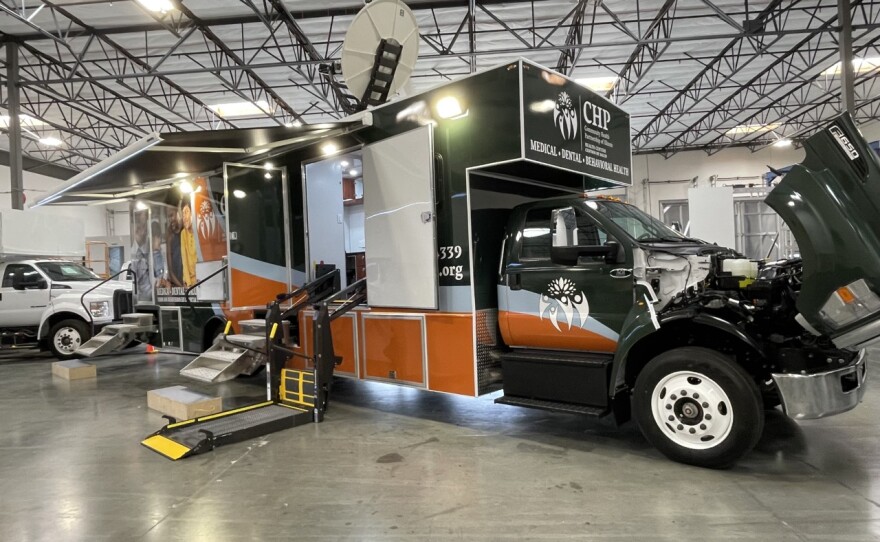Community Health Partnership of Illinois (CHP), which provides primary care and access to affordable health care to seasonal and migrant workers, recently relaunched its seventh Illinois health center, in Princeville, giving qualified families in central Illinois more access to the organization's services.
Eleace Sawyers, the CEO of CHP, said the agency is a federally funded initiative that was started to prioritize the needs of migrant and seasonal farmworkers, but people who are classified as “underserved” and “uninsured” also can be helped by CHP.
Sawyers said there is a national dilemma where many migrant seasonal farmworkers work in harsh and potentially unsafe conditions, and some of them cannot afford health care for themelves or their families.
“We've always had the conversation about ‘how does food get on our tables for us to nourish our bodies?’ and it is from the efforts of farmers. So, someone has to take care of them as well. So, our doors are open to all, not just migrant seasonal farmworkers,” Sawyers said. “We are specially and specifically funded by the federal government to provide primary health care for the migrant seasonal farmworkers.”
Sawyers said CHP is concerned with bridging the gap where medical disparities exist.
Sawyers said the agency offers medical, dental and behavioral health services, and CHP launched a new mobile medical unit on Aug. 9 to serve patients where they live and work.
"So, with a new mobile unit, we'll be able to reach even more of our populations because usually we would educate them in the field where they live and work, and we would link them to other primary care providers. Now, we can link them to our brick-and-mortar sites where we have primary medical services offered. We can also now link or connect and create access for care with the mobile units right there where we locate our migrant seasonal farmworkers and other uninsured, underserved populations that may need medical care,” Sawyers said.
Down the road, she said one of CHP’s goals is to go into people homes to provide them with health care.
CHP began training and equipping community health workers in 2021 to connect with and educate populations of people throughout Illinois on their health care options.
“Our staff is very diverse. (The) majority of our population is Latin speaking. We do have, in terms of our workforce mix, a very diverse workforce as well that understand the patient needs and also speak the appropriate language. We've been around for more than 50 years,” Sawyers said.
For patients facing transportation barriers, Sawyers said CHP offers transportation for patients to go to and from CHP’s medical facilities.
“We've always had the conversation about ‘how does food get on our tables for us to nourish our bodies?’ and it is from the efforts of farmers. So, someone has to take care of them as well. So, our doors are open to all, not just migrant seasonal farmworkers. We are specially and specifically funded by the federal government to provide primary health care for the migrant seasonal farmworkers.”Eleace Sawyers, CEO of Community Health Partnership of Illinois
Sawyers said the pandemic took a toll on the number of migrants and their families that CHP has been able to reach. Typically, she said 7,000 migrants and their families are served annually by CHP, but only about 4,000 people were enrolled in CHP’s programs as of last December.
Now, Sawyers said reaching more families is a priority. Many patients that CHP supports face challenges relating to health, housing, food insecurities, and the inability to find providers for their health care needs.
Specifically, Sawyers said CHP still faces challenges linking migrant seasonal farmworkers and underserved populations with specialty care such as cardiology, upper GI care, podiatry and more.
“In addition to them being new to the communities at large and also being able to be connected to care like organizations like CHP, you also find transportation is a barrier,” Sawyers said.
Sawyers continued, “…So, that is why it is so great that we can take a mobile unit out, provide the care, have our community health workers and our navigators educate and link those that need additional services from food, to housing, to transportation. So, our teams are educated with the resources in the central Illinois area to link our patients to those as well.”
Sawyers emphasized that nobody who comes to CHP for help will be turned away regardless of their ability to pay.
“CHP, like many other federally-qualified health centers, (is) guided by the federal government in terms of how we provide care. We offer health care on a sliding fee scale basis. So, we turn no one away, as I mentioned earlier. When we say sliding fee scale, if a person comes to us for care, we ask for a certain level of information to qualify them on a slide,” Sawyers said.
More information about CHP's locations and services is available on CHP's website.





